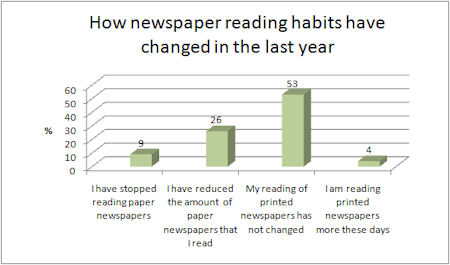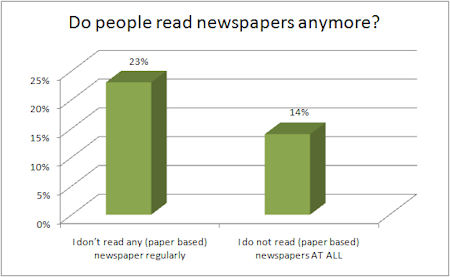According to latest estimates from the National Readership Survey (NRS), the gross figure for the readership of national dailies fell by 2.5 per cent in the last year alone, and for Sunday papers it fell by 3.2 per cent. These figures compare readership in the period July 08-June 09 with July 07-June 08. This continues a downward trend that has been evident for decades, but has certainly been speeded up by the advent of the Internet. In addition, latest research commissioned by PRmoment, suggests that 26% of people read fewer newspapers than they did 12 months ago.

Supplied by Opinium Research
With the fear that the UK printed newspaper industry is doomed, it is interesting seeing what is happening in the US, as this is likely to reflect, and to some extent predict, our own future. Thad McIlroy, a US-based electronic publishing consultant and analyst whose website www.thefutureofpublishing.com discusses the prospects of all forms of publishing, says that he finds the newspaper industry one of the easiest to dissect. He explains: “There's the old chestnut about the death of the rail industry in the US where commentators point out that if the owners of the many railways had realised at the turn of the last century that they were in the transportation business rather than the railway business they might have survived the transformation to automobiles and later airplanes. In a similar vein, the major problem with the newspaper business lies in the paper. The proprietors of newspapers are in the news business, not the newspaper
business.”
MacIlroy points out that the problem faced by most industries as technology moves forward, is that the economic model of the existing industry is almost always heavily dependent on certain practices that cannot easily be transferred to the new digital form. And so the newspaper industry, which traditionally has earned the bulk of its income from display and classified advertising, and also by the distribution of the physical product, faces a crisis. “First, the classified advertising fled to the Web, as the Web proved a far better technology for this type of advertising, both economically and in utility. Display advertising was next to be challenged by more targeted and measurable Web banner ads (although it has not been quite as heavily damaged as classified). Finally, of course the printed product itself.”
However, the decline in physical newspaper readership far predates the Internet. MacIlroy adds: “It has been greatly accelerated by the Web, but the trend lines were already evident. And here we confront a simple factor: While a large LCD screen and a surround-sound system can greatly enhance the experience of watching a film or television show, the physical newspaper is limited in utility: not bad on a bus commute (if you've got a seat), something to relax with over breakfast or when returning from work (assuming you do so and still have a hour to leisurely skim the pages), and a few other places. But if you do have Web access, suddenly all of the newspapers in the world are at your disposal, and if your interest truly is news and information, the medium of the Web is far superior to ink on paper.
Our research suggests that 23% of UK consumers no longer regularly purchase a newspaper. This ties in with MacIlroy’s bleak conclusion for the newspaper industry: “I simply cannot conjure a scenario that bodes well for the newspaper business. The news business will of course continue; well-researched and well-reported news is perhaps more important than ever. But we await an economic model that will permit companies to pay ‘the talent’ sufficiently well to do their jobs well in the new news business.”

Supplied by Opinium Research
Not everyone agrees that immediate prospects are quite so negative for those hoping to be successful in the paper-side of the news business. Catherine O'Connor, acting head of journalism at Leeds Trinity and All Saints University College, recognises the threats the industry faces, and takes a great deal of interest in the current debates about its future. She appreciates that the recession has hugely increased the pressure on news media and that this pressure, “has forced a shift in the debate and a focus on the future of journalism itself, particularly the need to protect public interest reporting and investigative journalism.” However, O’Connor points out that the amount of change the industry is going through, makes it hard for anyone to accurately predict where it will end up.
O’Connor believes it is important to focus on the positives: “Despite doom-and-gloom predictions for the last few years, newspapers are still with us and they are fighting hard to make print and online work side-by-side. You don't have to spend long looking at the press – either regional or national – to see some great examples of first-class journalism.“
It may appear that there is so much more information and news available online, but as O’Connor says, it's important to remember that many of the online news sites, recently referred to by Rupert Murdoch as “content kleptomaniacs“, aggregate material from newspapers rather than generating news themselves. She continues: “Newspapers provide material which is of huge value and that's why the industry is finally making moves to charge for at least some of its online content. And it's not just newspapers as businesses which have a vested interest in this – it's in the interests of each and everyone of us that journalism's ability to inform and educate, to dig into issues and to challenge is maintained."
Opinium Research carried out 1139 online interviews for PRmoment in the UK, from 03 to 04 November 2009.
If you enjoyed this article, sign up for free to our twice weekly editorial alert.
We have six email alerts in total - covering ESG, internal comms, PR jobs and events. Enter your email address below to find out more:




